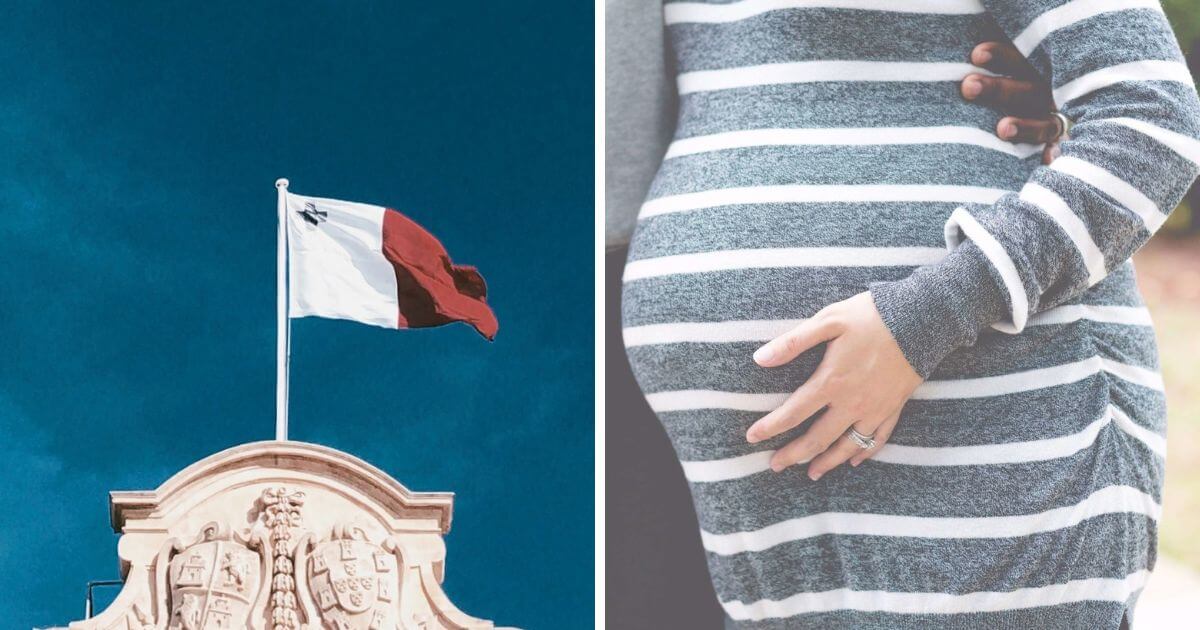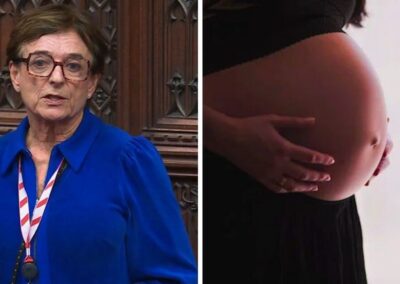There has been a lot of media coverage of claims from ‘pro-choice’ organisations that a woman in Malta is being denied an abortion that would save her life.
Much misinformation about abortion legislation in Malta has been spread online and it is important that the public are aware of how the law operates in Malta when a pregnant women’s life is at risk.
What happens if a pregnant woman’s life is at risk in Malta?
Dr Calum Miller, NHS doctor and research associate at the University of Oxford specialising in abortion policy has provided a helpful overview of the law in Malta in this area.
Dr Calum Miller said: “Maltese law and medical practice clearly allow premature delivery of the child where the woman’s life is at risk – regardless of whether the baby is alive, has a heartbeat, and regardless of whether it is viable”.
“Maltese doctors have for years, in many cases (though these cases are still very rare) delivered the child early, in some cases with the child subsequently passing away, in order to save the mother’s life”.
“None of them have ever needed to worry about legal repercussions. Pro-life obstetricians do this in every country around the world”.
“The law is absolutely clear: where a woman’s life is at risk, premature delivery is permitted, regardless of any other factors.”
Dr Calum Miller also outlines that this has been made clear by Malta’s leading judges, including Giovanni Bonello, who was formerly a judge at the European Court of Human Rights.
Professor George Gregory Buttigieg, who is a professor of obstetrics based in Malta, and Doctors For Life, a Maltese organisation that has hundreds of members, released statements outlining how the law in Malta operates in these situations in more detail.
Are procedures to remove an unborn child who had died after a miscarriage illegal in Malta?
A number of media outlets claimed that the woman had a miscarriage.
That the baby ‘still had a heartbeat’ has also been reported by a number of other outlets and has not been disputed.
A miscarriage occurs when ‘a baby dies in the womb before 20 weeks of pregnancy’, whereas in this case, it was reported that the baby still has a heartbeat and has not died.
If this baby had died, there is no legislation or policy in Malta that prevents the unborn child being removed from the mother’s womb. Given an estimated one in five pregnancies end in miscarriage, hundreds of these procedures take place in Malta each year and it is not disputed that these procedures are legal in Malta.
What is the current abortion law in Malta?
There is currently full protection for the unborn child in Malta.
As a result of this unique law and culture, there are likely thousands of people alive today because Malta did not enact similar legislation to the UK’s Abortion Act that was introduced in 1967.
For the people of Malta, these are their sisters, brothers, friends, nieces, nephews, aunts, uncles and cousins.
In England and Wales – where abortion is available up until birth if a baby has a disability – people with disabilities are unjustly and disproportionately targeted by abortion legislation. The latest available figures show that 90% of children diagnosed with Down’s syndrome before birth are aborted in England and Wales.
Malta has a very different approach. Disability-selective abortion for Down’s syndrome is not permitted and there is a culture of welcoming and supporting people with this disability rather than eliminating them.
Where do the people of Malta stand on abortion?
Polling has consistently shown that Malta is one of the most pro-life countries in the world.
A recent MaltaToday Survey showed that 97% of the population opposed unrestricted abortion at whatever stage of pregnancy and 90% of the population in Malta oppose unrestricted abortion being available in the first three months of pregnancy.
Where do the political parties in Malta stand on abortion?
The two main political parties in Malta, the Labour Party and the Nationalist Party, both publically support current abortion legislation in Malta.
Ahead of the 2022 Maltese general election, following a nationwide campaign run by pro-life campaigners, both parties made public commitments to ensure continued legal protection for unborn babies.
In an interview in 2020, the head of the Labour Party and Prime Minister, Robert Abela, said there would never be a referendum on abortion in Malta and that he was “against abortion in all circumstances”.
Similarly, the head of the Nationalist Party, Bernard Grech, said that he was “proud that [his] party is in favour of life”, and that he had “never had a problem with swimming against the current”.
He added: “For me the baby [should be] privileged. Because it is a life, a person, who no one can defend more so than its parents, and if one of its parents wants to [end his or her life], it seems to me that I have an obligation as a human, before a politician, that I defend that life”.
What do ‘pro-choice’ organisations want to see in terms of a law change in Malta?
In 2021, abortion campaigners worked with Maltese MP Marlene Farrugia to present a Bill to remove all existing protections for the unborn child and restrictions on abortion in Maltese law.
This was Bill was introduced under the guise of ‘decriminalising’ abortion law. The term ‘decriminalise’ is a misnomer commonly used by abortion activists to describe a change to legislation that involved removal of all restrictions around terminations. The proposed change to the law would have allowed abortion on-demand, for any reason, up to birth.
This Bill was not debated in the Maltese Parliament and fell when the 2022 General Election was called, but if it had been successful, this law change, where there would be no restrictions on abortion at all, would have introduced the following:
Abortion would be available on demand, for any reason, up to birth.
With no restrictions on abortion, abortion would be available on demand, for any reason, up to birth.
Sex-selective abortion would be legalised.
Given that the proposed change in the law would have removed all restrictions on abortion, this would have also legalised sex-selective abortion. Sex-selective abortion usually targets baby girls due to a preference among certain parents and some cultures for having sons.
This is not speculation: this practice is already happening in other countries that have very permissive abortion laws such as the UK, and it is possible that a form of ‘abortion tourism’ would arise as people from other countries might seek abortions in Malta on the basis of the sex of their child.
Disability-selective abortion for babies with disabilities including Down’s syndrome, cleft lip and club foot would be introduced.
If there was no legal restriction on abortion, this would legalise disability-selective abortion for disabilities including Down’s syndrome, cleft lip and club foot.
In England and Wales – where abortion is available up until birth if a baby has a disability – people with disabilities are unjustly and disproportionately targeted by abortion legislation. The latest available figures show that 90% of children diagnosed with Down’s syndrome before birth are aborted in England and Wales.
Malta currently has a very different approach. Disability-selective abortion for Down’s syndrome is not permitted and there is a culture of welcoming and supporting people with this disability rather than eliminating them.
Twin abortions would be legalised – select one to live and one to die.
In England and Wales in 2018, 111 ‘selective-termination’ procedures were performed, where a twin, triplet or more were aborted in the womb. This is often done to ‘reduce’ the number of babies in a pregnancy.
There would be no legal restrictions on this controversial type of abortion taking place in Malta.
Partial-birth abortion would be legalised.
With no legal restriction on abortion up to birth, there would be no legal restrictions on the types of abortion methods used to abort babies. This could allow for the use of particularly gruesome abortion methods such intact dilation and extraction abortions (also known as partial-birth abortions) and other controversial methods of abortion.
A ‘partial-birth’ abortion involves the following:
– Feticidal injection of digoxin or potassium chloride may be administered at the beginning of the procedure to allow for softening of the fetal bones.
– During the procedure, the fetus is removed in a breech position.
– If the baby’s skull is too large to fit through the birth canal, it is crushed to allow the skull to be removed. Decompression of the skull can be accomplished by incision and suction of the contents, or by using forceps.
There would be no requirement to give pain relief to babies during abortions.
With no legal restriction on abortion up to birth, there would be no legal requirement that babies undergoing a late-term abortion receive pain relief ahead of being aborted.Bear in mind that many of these late-term abortions will have to be performed using a dilatation and evacuation (D&E) procedure in which, according to the Royal College of Obstetricians and Gynaecologists (RCOG), the ‘fetus is removed in fragments’. For some procedures, babies will first receive an injection of potassium chloride to effectively induce a heart attack – it can take minutes to several hours to work according to abortion provider BPAS.
No law to help prevent partners from coercing a woman into having an abortion.
Legal coercion protections provide a process to ensure that women are not being coerced by their partner, family, friends, or others to have an abortion.
The sad reality about abortion is that, in some cases, women who don’t want abortions are put under intense pressure to have one, with the people who should be supporting them using intimidation, threats and even driving them to the abortion clinic.
Without any law restricting abortion up to birth, there would not be any specific legal provisions in place to require those providing abortions to ensure that the woman is not being coerced.
Fast-tracked abortions would be possible: No consideration period for women
In a number of European countries, including the Netherlands, Belgium and the Republic of Ireland, there is a consideration period in place before an abortion can take place.
This period gives a woman who is considering an abortion more time to consider all of the options available to her. In the event of this extreme proposal becoming law, there would be no consideration period in place in Malta.
This is especially concerning given the likelihood that private abortion providers such as Marie Stopes International – who have been accused by the UK Care Quality Commission of using high-pressure sales tactics to get women to undergo abortions and have also run ‘lunch-hour’ abortion services – could look to ‘set up shop’ in Malta.
Private abortion clinics’ horrific history of abuses would likely be worse in Malta with no legal restrictions.
Abortion providers, such as Maries Stopes International, would likely seek to capitalise on the opening of a major new market without all the current legal safeguards they have to adhere to in England and Wales. There could see a surge in the building of new, private abortion clinics in Malta.
These private abortion clinics in England and Wales have proven that they cannot be trusted – for some examples of when these clinics have been caught out, see: https://righttolife.org.uk/news/tag/marie-stopes-international
Malta could become the late-term abortion capital of Europe
With a median 12-week time limit for abortion on demand or on broad social grounds across EU countries, and with the grounds for late-term abortions often being very restrictive in these counties, Malta could become the late-term abortion capital of Europe – with people travelling from all over Europe to get babies aborted very late in pregnancy.
How have pro-life groups and doctors in Malta responded to the case?
Professor George Gregory Buttigieg [KM, MD, PhD, LRCP(End.), MRCS(Lond.), Ma(Melit), FRCOG, FRCPI, FRCP ED] who is a professor of obstetrics based in Malta has said:
“A report from a pro-abortion activist group regarding a clinical situation at Mater Dei hospital has come to our attention. If the reports are correct, this patient appears to have premature rupture of membranes at 16 weeks, with possible placental abruption as well”.
“Maltese law and medical precedent are absolutely clear: if a woman’s life is at risk from her pregnancy, then it is absolutely legal for her pregnancy to be ended by delivering the child, even if that child has a heartbeat, and even if the child will sadly pass away. This would not be seen in Maltese law or medicine as an abortion. As a Professor of Obstetrics, I have delivered babies prematurely in life threatening situations and have never been worried about legal repercussions”.
“To be clear: if a woman’s life is at risk from her pregnancy, she and her doctor will be afforded absolute protection from the law if the child is delivered. Whether the child has a heartbeat or is alive or not is irrelevant in this sense”.
“Therefore, whether delivery is permitted in a given situation is a *clinical* question as to whether her life is at risk. If it is not, then abortion would not be permitted, but nor would it be necessary. Though the chances are low, the baby may survive and the membranes may also rarely re-seal with the pregnancy continuing. If, on the other hand, the mother’s life is at risk, delivery is permitted regardless of any other factors”.
“It is inevitably difficult to estimate whether the clinical situation requires delivery with only a one line report from a pro-abortion activist organisation. In ordinary cases of premature rupture of membranes, there is no significant risk to the mother’s life unless there are signs of infection or haemorrhage as for example from abruptio placentae. Carefully monitoring and observing for infection is good medical practice as in this case, and can save the child without putting the mother’s life at risk”.
“In this case there is a vague and unclear hint expressed in the public reports regarding a possible placental abruption as well. The newspaper report makes no reference to this. If there is premature rupture of membranes and a clear clinical picture of placental abruption, therefore, then the law is absolutely clear that delivery is legal. Maltese doctors have delivered babies prematurely in many such life-threatening situations before and have never faced legal repercussions. No change in the law is required for this. Malta has had similar situations before and has never seen a woman’s life genuinely risked. This is why Malta, based on the last ten years of no maternal deaths from any cause, has the lowest maternal mortality ratio in the entire world. Our pro-life laws protect lives, rather than ending them, and we should be proud to be world leaders when it comes to maternal healthcare”.
Doctors for Life, a Maltese organisation that has hundreds of members released the following statement:
“Doctors for life is closely following developments on the 16-week, pregnant US citizen who unfortunately presented with premature rupture of membranes (broken waters) and bleeding”.
“We genuinely empathise with the apprehension of the couple in question and want to emphasise that the practice at Mater Dei Hospital always seeks to ensure that the mother’s life is always protected and given priority”.
“Whenever such a case presents to hospital, a careful assessment is made to assess the severity of the condition. The patient is intensively monitored and promptly treated for any signs of infection. If serious haemorrhage or infection supervenes, then the uterus is always evacuated. Such a decision is taken at the highest clinical level and would involve at least 2 consultants”.
“Premature rupture of membranes does not always result in infection and not all such pregnancies end up in a spontaneous miscarriage. This is why not all cases require evacuation of the uterus (induced labour) at the outset. Nevertheless, if it is required then this is done, even if the foetus is too young to survive outside the womb. Each case is assessed and managed on its own merits by the caring specialist”.
“This practice has stood the test of time and our zero percent maternal mortality for the last 12 years attests to that”.
“We hope that the Health department may be forthcoming in providing some details about this case in order to reassure those who may be concerned about the level of care delivered at Mater Dei in such cases”.
Dr Miriam Sciberras, chairman of Life Network Foundation Malta, who are the leading pro-life organisation in Malta, said:
“We have seen the reports about the clinical situation of the pregnant woman, Andrea Prudente, who needs medical care, and who was admitted to Mater Dei hospital”.
“We don’t know the full facts of the case and we understand she is receiving the care that she needs”.
“Malta has an excellent track record of caring for pregnant women. If the life of the mother is at risk, the doctors in Malta have the legal and ethical obligation to do all that they can to save the life of the mother whatever the consequences to the unborn child”.
“Life Network is willing to help in any way if the mother or her partner need support”.
“We await further details to be able to comment on the case. We wish the woman and her partner the best outcome in this delicate situation and ask that media reports do not exploit this vulnerable situation”.
Further reading
- Malta Independent – Malta does allow for abortions in case of life or death situations
- Times of Malta – Giovanni Bonello (formerly a judge at the European Court of Human Rights) – Correct reading of the criminal law
- Doctors for Life statement – Pregnant Mother At MDH
- Life Network Foundation Malta statement
- Right To Life News – Malta: Both major parties confirm pro-life position on abortion












